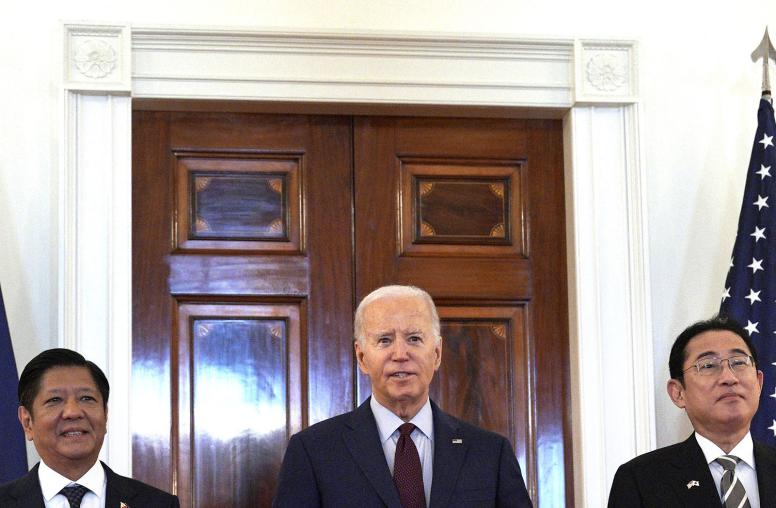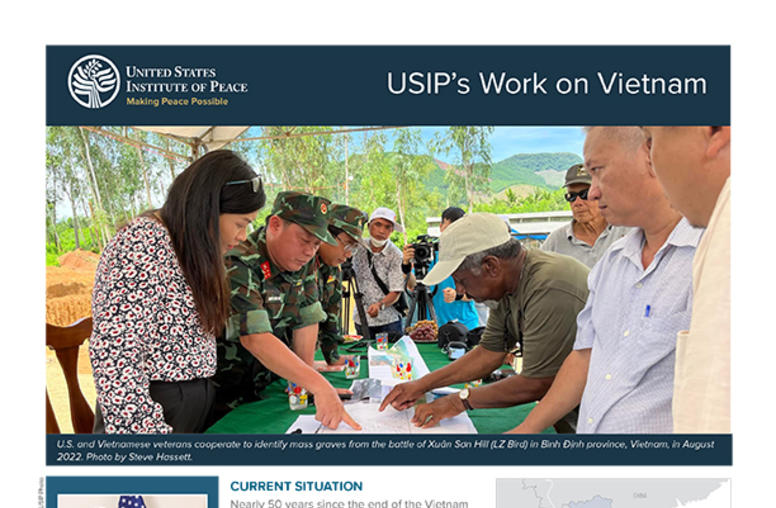Publications
Articles, publications, books, tools and multimedia features from the U.S. Institute of Peace provide the latest news, analysis, research findings, practitioner guides and reports, all related to the conflict zones and issues that are at the center of the Institute’s work to prevent and reduce violent conflict.

A Rising Philippines Faces a Crucial Year Ahead
By virtue of its geography alone, the Philippines is arguably Southeast Asia’s most strategically important country. Yet its actual influence has tended to lag its potential due to decades of socioeconomic struggle and internal instability, especially in its restive southern island of Mindanao. In recent years, however, the Philippines has rapidly emerged as one of the most consequential countries in the Indo-Pacific, driven in large part by President Ferdinand Marcos’ transformative policies on national security, defense and foreign relations.

China's Vision for Global Security: Implications for Southeast Asia
China’s Global Security Initiative (GSI) marks a new phase in Beijing’s ongoing push to change the international security order. Through the GSI, China seeks to establish itself as a counterbalance to U.S. influence and to reshape security management in a number of strategically important regions. The GSI is still in the early stages of implementation, but it has already demonstrated the potential to disrupt the existing security framework in Southeast Asia. This may lead to increased polarization within the Association of Southeast Asian Nations (ASEAN), with some member states aligning with the GSI and others remaining cautious due to their stronger affiliations with the United States.

Amid a Changing Global Order, NATO Looks East
As NATO celebrates its 75th anniversary this year, the Euro-Atlantic security alliance continues to deepen its engagement with Australia, Japan, South Korea and New Zealand, collectively known as the IP4. NATO has collaborated with these countries since the early 2000s, but Russia’s war against Ukraine, security challenges posed by China and renewed strategic competition have led to increased engagement. As the war in Ukraine grinds on and U.S.-China competition shows no sign of abating, the United States has much to gain from collaboration between its allies and partners in the Euro-Atlantic and Indo-Pacific.

China Forces Myanmar Scam Syndicates to Move to Thai Border
While Myanmar has long been the chief venue for the criminal operations of Chinese-origin gangs in Southeast Asia, these organizations have always stood ready to move — internally or across borders — if their sources of protection dissolved. In recent months, the organized crime kingpins have once again faced a fraying safety net. This time, the cause is the weakening of Myanmar’s corrupt coup regime in the face of a rising, multi-front revolution and, perhaps more importantly, an aggressive push by China’s law enforcement authorities.

Huawei’s Expansion in Latin America and the Caribbean: Views from the Region
Since its founding in Shenzhen, China, in 1987, Huawei has grown into one of the world’s major information and communications technology companies, but its ties to China’s government and military have been regarded by US officials as a potential risk to national security. Latin American and Caribbean countries, however, have embraced the company for the economic and technological benefits it provides. This report explains the stark contrast between Huawei’s standing in the United States and its neighbors to the south.

The Indo-Pacific’s Newest Minilateral Emerges
Last week, Philippines President Ferdinand Marcos Jr. stepped foot in the Oval Office for the second time in a year. Joining Marcos this time was Japanese Prime Minister Fumio Kishida, the leader of the United States’ most important ally in Asia and, arguably, the world. The Philippines has long been among a second rung of regional allies, so this first-ever trilateral summit marks Manila’s entrance as a leading U.S. ally working to maintain order and prevent Chinese revisionism in East Asia.

The Current Situation in Vietnam
Nearly 50 years since the end of the Vietnam War, and more than a quarter-century since the normalization of U.S.-Vietnam relations, Vietnam is emerging as a rising power at the heart of the Indo-Pacific region and an increasingly important U.S. partner. Once one of the world’s poorest and most isolated countries, Vietnam is now a middle-income country with a dynamic, young population and a promising future.

China’s Alternative Approach to Security Along the Mekong River
Speaking about “the rise” or the “emerging role” of the People’s Republic of China (PRC) makes little sense these days. The country is no longer simply transforming in a major power, but rather has achieved a level of influence that many other major countries around the world perceive as a threat economically, politically and militarily.

Increasing Information Access for the North Korean People
In recent years, North Korea has become more repressive, more impoverished and more allergic to the outside world. Already turning inward after the failure of diplomatic efforts in 2019, the North Korean government isolated itself further amid the global COVID-19 pandemic. North Korea has learned to operate, and Kim Jong Un has learned to rule, with greater levels of self-isolation than aggressive international sanctions regimes could ever hope to impose. Given North Korea’s current mode of rejecting even humanitarian assistance and its recent turn toward Russia, the chances for diplomatic breakthroughs with Pyongyang look like a wishful long-term hope at best.

Whither NATO at 75?
NATO marked its 75th anniversary last week at a celebration in Brussels. While Russia’s invasion of Ukraine has injected the alliance with new life and resolve, the 32-member collective security pact is also wrestling with its future in a world of growing great power competition. In 2022, NATO formally identified for the first time China as a challenge to its interests and collective security. As NATO continues to support Ukraine and look to future global challenges, it also has internal issues to address, ranging from individual member defense spending to the problems posed by the need for collective decision-making among 32 members.